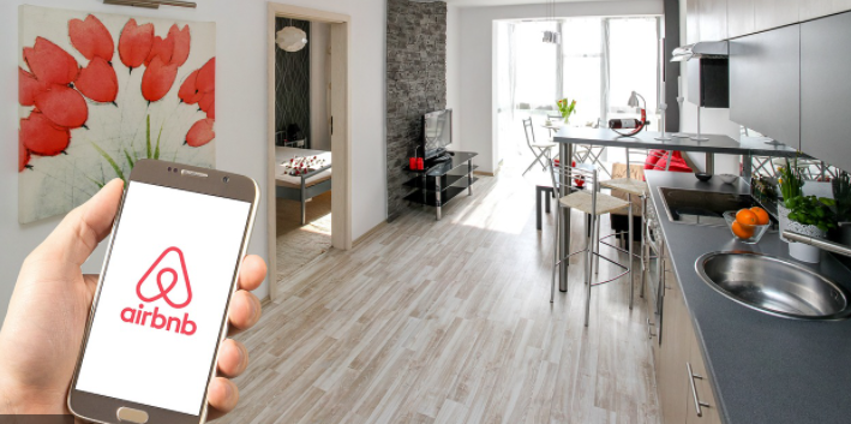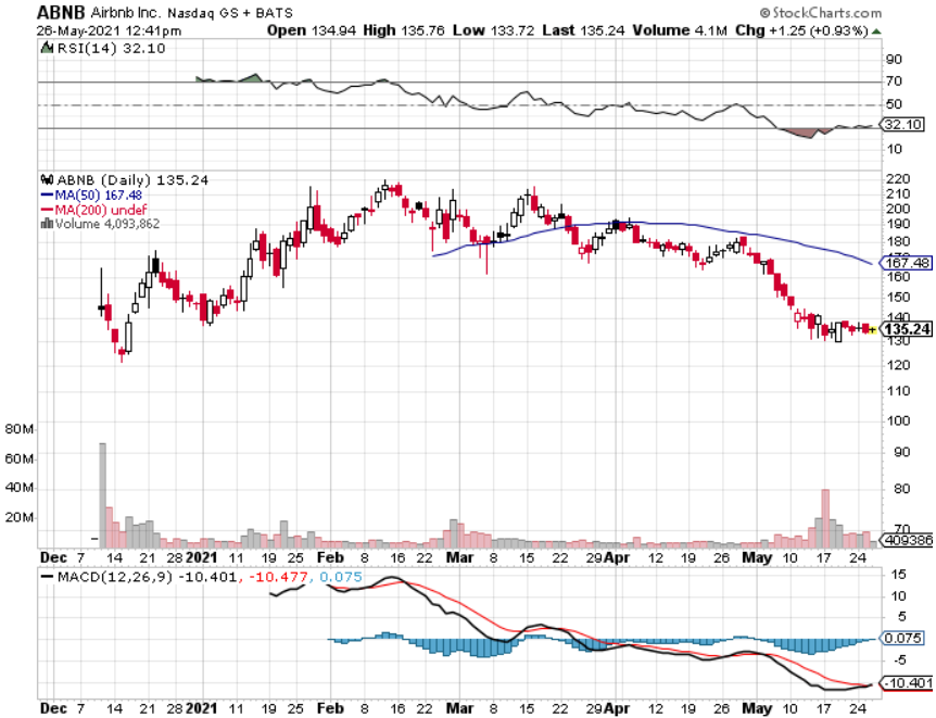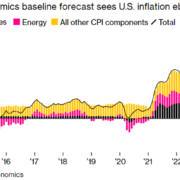Should Readers Dip Back Into Airbnb at $135?
Airbnb (ABNB) was disproportionately affected by the public health crisis because tech firm relies on travelers booking accommodation on their platform which they pocket a substantial commission.
To learn they only lost revenue of 22% over the past year was quite extraordinary because it could have been worse.
Looking forward, this is an intriguing stock that is trading around $135 today which is a more reasonable valuation from the $220 it was trading at after its direct listing.
I am net positive on Airbnb because the business is dramatically improving with the rollout of vaccines and the easing of some travel restrictions.
While conditions aren’t back to what they were, they are improving.
People's desire to travel combined with tightly managed expenses drove a return to positive top-line growth and materially improved adjusted EBITDA last quarter when Airbnb did quarterly revenue of $887 million.
It was an increase of 5% year over year, and it exceeded Q1 2019 levels as well.
Their business improved without the recovery of two of the strongest historical segments: urban travel and cross-border travel.
They expect the return of urban and cross-border travel to be significant tailwinds over the coming quarters.
What are some of the new trends from the travel data?
Travelers are visiting smaller cities, towns, and rural communities. And when people do travel, they’re staying longer. 24% of nights booked in Q1 were for stays of 28 nights or longer. People are not just traveling in Airbnb, they’re now living on Airbnb.
In New York City, in Los Angeles, they had almost as many nights booked for stays longer than 28 days as they had stays under 28 days.
Why do I see sustained health in this business?
Listing growth has stayed strong with more than 5.6 million listings which is more than 1 million more than they had this time in 2019.
The growth is in nonurban listings.
Their host churn in Q1 is actually lower than host churn in the same period in 2019.
The 30% growth in nonurban and vacation rental listings is a harbinger for growth to come and shows that Airbnb was able to build out more capacity for the future travel mania once borders open up.
One interesting thing to note is that business travel appears to be never coming back because many employees are working remotely. They're going to need to go back to headquarters occasionally. You're going to see longer stays going in cities and accessing offices in a hybrid sort of way.
But the bigger trend is going to be flexibility. I think that most of us working around the world if we are privileged enough to say this, are more flexible than we were before the pandemic. Because the world of Zoom means a world where we can work anywhere, it is a world where many people are also choosing to live anywhere.
As hosts begin to ramp up for the summer travel season, Airbnb is seeing Average Daily Rates (ADRs) in Q1 up 35% year over year. That was after being up 13% year over year in Q4. But the year-on-year comparable data were up against March 2020 that had a catastrophic performance.
Right now, 80% of nights booked in Q1 were domestic, and with domestic travel being consistent is now the main strength all around the world.
The rebound has been drastically earlier in the U.S., which has a higher average daily rate.
The incremental growth is in the non-urban single-family home and even larger homes, and those are just, on average, a higher ADR because bigger homes go for higher prices.
The problem I have is that the business model has changed away for this cash cow of cross-border travel where it used to be 50% of total nights were cross-border nights.
International travelers are usually willing to pay a premium when they go to different countries compared to domestic travelers who understand the local pricing better.
If net cross-border nights don’t come back to pre-2020 numbers, and I don’t think they would completely, it’s clearly a net negative for the company.
Management has kept saying, “Our model is inherently adaptable”, yet what is the game plan if the blur between work and life corresponds to more 6-month and 1-year leases signed which would cut out the need for Airbnb?
Is Airbnb so adaptable they can slug it out in the property management business?
Management kept saying that trends are a “little hard to pinpoint” but it's clear that if these 28 days or more stayers get more comfortable with a location and start dabbling more with long-term leases or even long-term property ownership, or might I even say, for the elite to purchase multiple vacation homes, then the use case for using Airbnb is minimized greatly.
What I understood from this public health crisis is that consumers have become a great deal savvier in how they allocate money to housing and that means vacation housing too along with what they demand and expect from it.
This new machination inherently means that servicers and listings will need to increase the quality of their listings since workers who work from home will be living in the home more and not just drop their bags upon entrance and go to the beach for a day or 2.
Many listings have incomplete kitchen equipment and the lowest option internet and other ugly shortcuts.
Yes, I do believe there will be a revision to the mean via the “tailwind to urban travel and cross-border” but that mean has a lower ceiling than before 2020 which will cap the underlying shares’ potential appreciation.
I also believe that non-urban, suburban homes won’t be able to meet capacity for the U.S. demand because of HOA rules and stringent enforcement of them. Just read about the Lake Tahoe ordinances to get a little flavor about how difficult it is to put Airbnb places where they don’t fit naturally. It’s easier to get away with it in big cities when entire buildings and even blocks are Airbnb investment properties, but not in suburbia.
Travel will come back hardcore and even 8% of Google search today is travel-related.
I do believe Airbnb is a good stock to buy right now, but the world has forever changed, and their business model has been damaged by it.
I’ll go for the low-hanging fruit now in Airbnb, but their growth story has been in fact pulled backwards instead of forward, and that wasn’t supposed to happen to “tech” companies.
That being said, they are good for a short-term trade today, but I would have said it was a buy-and-hold before the pandemic.
Enjoy this recovery story but remember to take profits when momentum fizzles out.






